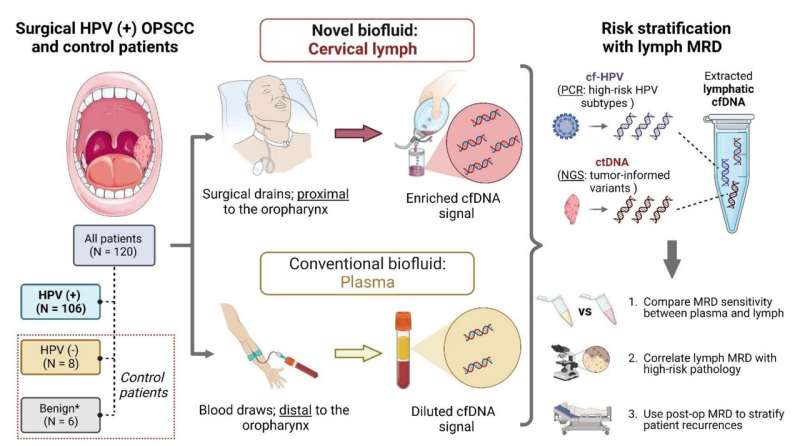This article has been reviewed according to Science X's editorial process and policies. Editors have highlighted the following attributes while ensuring the content's credibility:
fact-checked
peer-reviewed publication
trusted source
proofread
Novel liquid biopsy of lymph fluid could guide precision treatment for head and neck cancer

Lymphatic fluid from surgical drains, which is usually tossed in the trash, is a treasure in the hands of University of Pittsburgh and Washington University School of Medicine in St. Louis researchers who found that this liquid could inform more precise treatments for patients with head and neck cancer caused by human papillomavirus (HPV).
The new study, published in Clinical Cancer Research, shows for the first time that HPV DNA in lymphatic fluid collected after surgery is a powerful biomarker that could predict risk of cancer recurrence and help clinicians decide whether to ramp up adjuvant therapies or safely de-escalate treatment for patients with HPV-positive head and neck cancer.
"Over the last decade, there has been emerging interest in liquid biopsy to pick up cancer recurrences after treatment," said senior author José P. Zevallos, M.D., M.P.H., professor and Eugene N. Myers, chair of the Department of Otolaryngology at the Pitt School of Medicine and UPMC Hillman Cancer Center. "Our goal was to bring liquid biopsy into the curative pathway for head and neck cancer so that we can use it not just to find recurrences but also to help make treatment decisions."
Head and neck cancer once almost exclusively affected heavy drinkers and smokers, but the landscape of this disease has changed dramatically because of HPV, according to Zevallos. HPV-positive oropharyngeal squamous cell carcinoma (OPSCC) has now surpassed cervical cancer as the most common HPV-related malignancy, and incidences are rising rapidly worldwide.
Up to 30% of head and neck cancer patients experience recurrences driven by hard-to-detect cancer cells that evade treatment. Liquid biopsies aim to detect telltale signs of lingering cancers by measuring biomarkers found in blood, urine, and other body fluids. But Zevallos, a surgical oncologist, wondered if surgical lymphatic fluid could be more informative for head and neck cancer liquid biopsy.
"After surgery, patients typically have a surgical drain inserted to evacuate the lymphatic fluid that would otherwise build up under the skin and cause problems," said Zevallos. "This fluid is usually thrown in the trash, but our study shows that it's incredibly valuable. I love the concept of finding value in waste that has been overlooked."
The new study, led by Zevallos and co-senior author Aadel Chaudhuri, M.D., Ph.D., assistant professor of radiation oncology at Washington University School of Medicine in St. Louis, focused on a cohort of more than 100 patients being treated for HPV-positive OPSCC.
After patients underwent surgical removal of their tumor, the team collected surgical lymphatic fluid 24 hours after surgery, and they also took blood samples for comparison. Then, they measured cell-free DNA, the genetic material that is no longer within a cell but rather floats freely in acellular fluid.
They found cell-free DNA from HPV (cf-HPV) in 78% of lymphatic fluid samples but just 12% of blood samples. Strikingly, cf-HPV levels were thousands of times higher in lymph than in blood, suggesting that this surgical waste can detect cancerous DNA with more sensitivity than blood.
After surgery, patients may need adjuvant radiation therapy with or without chemotherapy to clear remaining tumor cells. The gold standard that clinicians use to make this decision is surgical pathology, which involves visually inspecting lymph nodes and surgical margins for evidence of malignant cells.
Analysis of lymphatic fluid closely reflected this gold standard. The abundance of cf-HPV in lymphatic fluid was strongly linked with how many lymph nodes the cancer had spread to and its aggressiveness in those nodes. Likewise, patients with zero metastatic lymph nodes had no detectable cf-HPV.
While surgical pathology is informative, it can be subjective and may not always accurately reflect the aggressiveness of a cancer, according to Chaudhuri. This gap is where the new test truly shines.
For example, two patients in the study were deemed to have a low risk of recurrence based on pathology results, so they did not receive adjuvant radiation therapy. They each went on to suffer cancer relapse within a year. While cf-HPV was not detected in blood, lymphatic fluid collected just 24 hours after surgery was positive for cf-HPV, suggesting that this test could detect high-risk patients who are missed by traditional tools.
"This test doesn't just replicate what pathology tells us, it gives us more information," said Chaudhuri. "We demonstrate that we can find aggressive cancers even when gold-standard pathology misses them. That's what makes this test such a game changer."
On the other hand, analysis of lymphatic fluid could potentially guide safe de-escalation of treatment in some patients. Three patients in the study who received adjuvant chemoradiation did not have detectable cf-HPV in their lymphatic fluid, suggesting they were at low risk of recurrence. The researchers speculate that less aggressive adjuvant therapy could have been appropriate, but this needs further investigation.
"This test is about precision intensification and precision deintensification," said Chaudhuri.
The team next developed a machine learning model to predict progression-free survival, or which patients will recur or remain disease-free, which included cf-HPV from both blood and lymphatic fluid as well as pathology data and other patient information. The model accurately identified low- and high-risk patients and cf-HPV of lymphatic fluid was a very important aspect of the model.
"We can use a liquid taken just 24 hours after surgery to predict which patients will eventually relapse and which ones will remain recurrence-free," said Zevallos. "This could be incredibly valuable for making treatment decisions in the clinic."
The team is now working to validate and extend their findings, including the development of a lymphatic fluid-based test for HPV-negative head and neck cancer.
More information: Noah Earland et al, Sensitive MRD detection from lymphatic fluid after surgery in HPV-associated oropharyngeal cancer, Clinical Cancer Research (2023). DOI: 10.1158/1078-0432.CCR-23-1789



















